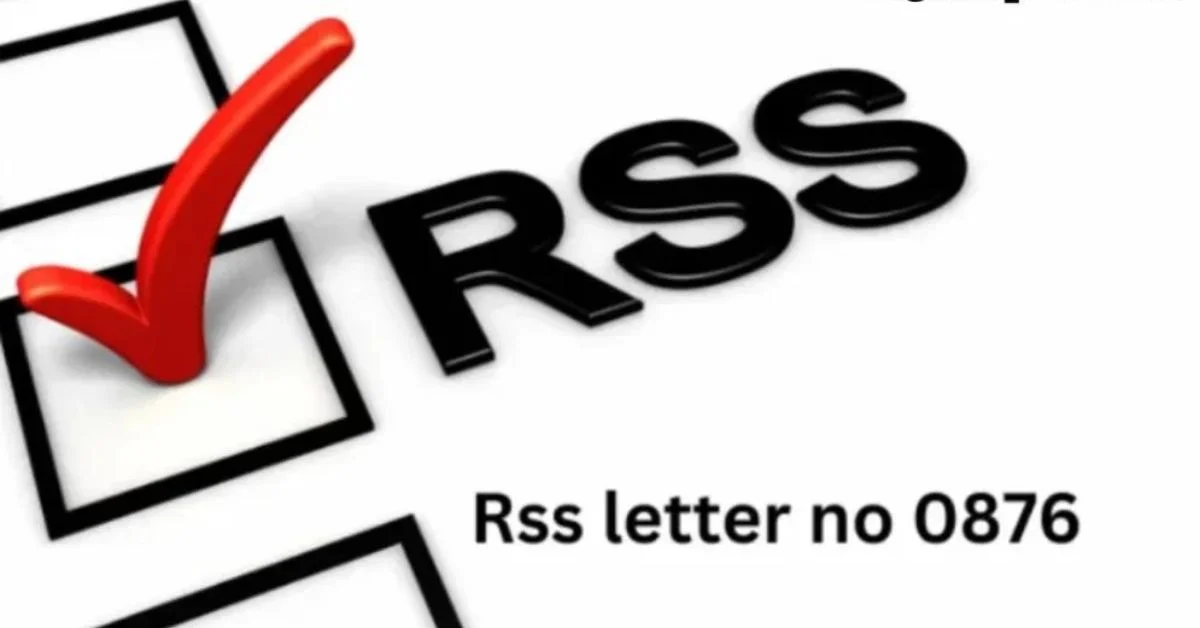Introduction
The advent of the internet has drastically changed how information is consumed and disseminated. Among the various tools and technologies developed to streamline this process, Really Simple Syndication (RSS) has played a crucial role. RSS feeds allow users to receive updates from their favorite websites without the need to visit each site individually. This technology has become indispensable for those who seek to stay informed in an age where data flows ceaselessly across digital channels.
One significant development in this domain has been the introduction of RSS Letter No 0876, a critical document that has influenced the evolution of RSS feeds and their implementation. This article will explore the origins, implications, and future trajectory of RSS Letter No 0876, providing a comprehensive understanding of its role in modern information dissemination.
Understanding RSS and Its Importance
What is RSS?

RSS, or Really Simple Syndication, is a web feed format that allows users to access updates to online content in a standardized, computer-readable format. RSS feeds can include content like blog posts, news articles, and multimedia elements. The simplicity and efficiency of RSS have made it a popular tool among web users, especially those who need to keep track of multiple sources of information simultaneously.
The Role of RSS in Information Dissemination
RSS plays a pivotal role in information dissemination by enabling users to receive content updates from their preferred websites directly to their feed readers. This mechanism bypasses the need to manually check each site, saving time and ensuring that users do not miss important updates. RSS feeds are particularly valuable for news organizations, bloggers, and content creators, providing a direct channel to distribute their content to a dedicated audience.
The Genesis of RSS Letter No 0876
Background and Context
It emerged at a time when the internet was witnessing exponential growth in content creation and consumption. As more websites began to offer RSS feeds, the need for standardization and guidelines became apparent. This letter was drafted as part of a broader initiative to address the challenges associated with the proliferation of RSS feeds and to ensure that they remained an effective tool for information dissemination.
The Purpose of RSS Letter No 0876
The primary purpose of RSS Letter No 0876 was to establish a set of best practices for creating and maintaining RSS feeds. These guidelines were intended to help content creators optimize their feeds for better user experience and ensure that the feeds were compatible with various feed readers. Additionally, the letter aimed to address issues related to the misuse of RSS feeds, such as spamming and content duplication, which were becoming increasingly prevalent.
Key Provisions of RSS Letter No 0876
Standardization of Feed Formats
One of the key provisions of RSS Letter No 0876 was the standardization of feed formats. Prior to the letter’s release, there were multiple versions of RSS in use, which led to compatibility issues across different platforms. The letter recommended the adoption of a single, standardized format to ensure that all RSS feeds could be easily read and processed by feed readers.
Best Practices for Content Creation
It also provided guidelines for content creation, emphasizing the importance of clarity, consistency, and relevance. Content creators were encouraged to use concise titles, clear descriptions, and appropriate keywords to enhance the discoverability and readability of their feeds. The letter also stressed the importance of updating feeds regularly and avoiding the inclusion of unnecessary or redundant content.
Addressing Security Concerns
With the increasing use of RSS feeds, security concerns became a significant issue. It addressed these concerns by recommending the use of secure protocols, such as HTTPS, to protect the integrity of the feeds. The letter also advised content creators to implement measures to prevent unauthorized access to their feeds and to regularly monitor their feeds for potential security breaches.
Encouraging Interoperability
Another important aspect of RSS Letter No 0876 was its emphasis on interoperability. The letter encouraged developers to create feed readers and other tools that were compatible with the standardized RSS format. This focus on interoperability was aimed at ensuring that users could access and consume RSS feeds across different devices and platforms without encountering technical difficulties.
The Impact of RSS Letter No 0876

Enhanced User Experience
One of the most significant impacts of RSS Letter No 0876 has been the enhancement of the user experience. By standardizing feed formats and providing best practices for content creation, the letter has helped ensure that RSS feeds are more user-friendly and accessible. This has made it easier for users to stay informed and engaged with the content that matters most to them.
Improved Content Distribution
It has also had a positive impact on content distribution. By encouraging the use of standardized formats and secure protocols, the letter has helped content creators reach a wider audience while protecting their feeds from potential threats. This has led to a more efficient and reliable system for distributing content across the internet.
Addressing Challenges in the Digital Age
The digital age has brought with it a range of challenges, including information overload and the spread of misinformation. RSS Letter No 0876 has played a crucial role in addressing these challenges by promoting the use of standardized, high-quality RSS feeds. By ensuring that feeds are clear, concise, and regularly updated, the letter has helped combat information overload and improve the accuracy and reliability of online content.
The Future of RSS and RSS Letter No 0876
Adapting to Emerging Technologies
As technology continues to evolve, so too must the tools and standards that govern information dissemination. It has laid a solid foundation for the future of RSS, but it will need to be updated and adapted to keep pace with emerging technologies. This may include the integration of new media formats, such as video and interactive content, as well as the development of more sophisticated feed readers and distribution tools.
The Role of Artificial Intelligence
Artificial intelligence (AI) is poised to play a significant role in the future of RSS and information dissemination more broadly. AI-powered tools could be used to enhance the functionality of RSS feeds, making it easier for users to find and consume relevant content. For example, AI could be used to automatically categorize and prioritize feed content based on user preferences, or to generate personalized summaries of feed updates.
Ensuring Privacy and Security
As the internet becomes increasingly interconnected, privacy and security will remain paramount concerns. RSS Letter No 0876 has already made strides in addressing these issues, but there is still work to be done. Future updates to the letter may need to include more robust recommendations for protecting user data and ensuring the security of RSS feeds in an increasingly complex digital landscape.
Conclusion
RSS Letter No 0876 has had a profound impact on the way information is disseminated in the digital age. By establishing a set of best practices for creating and maintaining RSS feeds, the letter has helped improve the user experience, enhance content distribution, and address key challenges in the online information ecosystem. As technology continues to evolve, the principles outlined in RSS Letter No 0876 will remain essential to ensuring that RSS feeds remain a valuable tool for staying informed in an increasingly complex and fast-paced world.
The future of RSS and information dissemination is likely to be shaped by ongoing advancements in technology, including the rise of artificial intelligence and the growing importance of privacy and security. By staying true to the principles outlined in RSS Letter No 0876 while adapting to these new challenges, content creators, developers, and users can continue to benefit from the power of RSS for years to come.
FAQs: Understanding RSS Letter No 0876
1. What is RSS Letter No 0876?
RSS Letter No 0876 is a document that provides guidelines and best practices for creating, maintaining, and distributing RSS feeds. It was introduced to standardize feed formats, improve content quality, enhance user experience, and address security concerns related to RSS technology.
2. Why was RSS Letter No 0876 introduced?
It was introduced to address the growing challenges associated with the proliferation of RSS feeds, such as compatibility issues, security concerns, and inconsistent content quality. The letter aimed to create a standardized approach to RSS feed development to ensure effective and secure information dissemination.
3. What are the key provisions of RSS Letter No 0876?
The key provisions of RSS Letter No 0876 include:
- Standardization of Feed Formats: Promotes a single, standardized format for RSS feeds to ensure compatibility across platforms.
- Best Practices for Content Creation: Guidelines for clear, concise, and relevant content to enhance discoverability and user engagement.
- Security Recommendations: Encourages the use of secure protocols (like HTTPS) and regular monitoring for potential security breaches.
- Interoperability Encouragement: Advocates for feed readers and tools that work across different devices and platforms.
4. How does RSS Letter No 0876 improve the user experience?
By standardizing feed formats and promoting best practices for content creation, RSS Letter No 0876 ensures that RSS feeds are easy to read, reliable, and accessible. This enhances the user experience by making it easier for users to find, consume, and stay updated with their preferred content.
5. How does RSS Letter No 0876 address security concerns?
It recommends the use of secure protocols such as HTTPS to protect the integrity of RSS feeds. It also advises content creators to implement security measures to prevent unauthorized access and monitor their feeds regularly for potential breaches.
6. What impact has RSS Letter No 0876 had on content distribution?
It has positively impacted content distribution by encouraging standardized formats and secure protocols. This has enabled content creators to reach a broader audience effectively while protecting their feeds from security threats, resulting in more efficient and reliable content dissemination.
7. How does RSS Letter No 0876 help in combating information overload?
By promoting high-quality, concise, and regularly updated content, It helps reduce information overload. It ensures that RSS feeds deliver only the most relevant and useful information to users, making it easier to manage and consume digital content.
8. What is the future of RSS with respect to RSS Letter No 0876?
The future of RSS, influenced by RSS Letter No 0876, involves adapting to new technologies, such as artificial intelligence, to enhance feed functionality and personalization. It also includes ensuring ongoing privacy and security measures to protect user data in an increasingly interconnected digital landscape.
9. Will RSS Letter No 0876 be updated in the future?
Yes, as technology evolves, RSS Letter No 0876 will likely be updated to address emerging challenges and incorporate new developments in digital content delivery, such as the inclusion of multimedia formats and advanced AI-based tools for content categorization and recommendation.
10. How can content creators implement the guidelines of RSS Letter No 0876?
Content creators can implement the guidelines by:
- Using a standardized RSS feed format.
- Ensuring clarity, consistency, and relevance in their content.
- Regularly updating their feeds and avoiding redundant information.
- Adopting secure protocols to protect feed integrity.
- Developing feed reader tools that are compatible across various devices and platforms.
Also Read: How Adele Net Worth Reflects Her Music Industry Dominance











